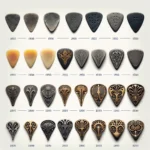Understanding Different Guitar Pick Materials and Their Impact on Tone
Choosing the right guitar pick is a crucial decision for any player, as it directly affects the tone and playability of the instrument. One important aspect to consider when selecting a guitar pick is the material it is made of, as different materials can have a significant impact on the tone produced.
One common material used for guitar picks is celluloid, which is known for its smooth surface and warm tone. Celluloid picks are favored by many players for their vintage sound and comfortable feel. On the other hand, picks made of nylon are popular for their durability and bright tone, making them suitable for various playing styles.
For those seeking a crisp and clear tone, picks crafted from acrylic offer a bright sound with excellent note definition. On the other end of the spectrum, picks made of metal, such as stainless steel or brass, provide a sharp attack and can add a metallic edge to the tone.
When it comes to natural materials, such as wood or bone, guitar picks can offer a warm and organic tone, with each material contributing its own unique sonic characteristics. Furthermore, the thickness of the pick also plays a role in shaping the tone, with thinner picks producing a brighter sound and thicker picks offering more power and depth.
Understanding the impact of different guitar pick materials on tone is essential for players looking to achieve their desired sound. Experimenting with various materials and thicknesses can help guitarists find the perfect pick for their playing style and musical preferences.
Finding the Perfect Thickness: How to Choose the Right Guitar Pick for You
When it comes to playing the guitar, finding the right pick can be a crucial decision for any player. One of the key considerations when choosing a guitar pick is the thickness. The thickness of a pick can greatly impact the sound and playability for the guitarist.
Generally, guitar picks come in various thicknesses, typically measured in millimeters. Thinner picks, usually ranging from 0.45mm to 0.7mm, are well-suited for strumming and producing a bright and jangly sound. On the other hand, thicker picks, around 0.8mm to 1.5mm, provide more control and are favored by lead guitarists for their precision and articulation.
When deciding on the right pick thickness for you, consider your playing style and the genre of music you prefer. If you are a rhythm guitarist playing acoustic folk music, a thinner pick may be the ideal choice, whereas a jazz or metal guitarist may opt for a thicker pick to execute intricate solos.
Furthermore, experimenting with different pick thicknesses can be beneficial in finding the perfect fit for your playing. Some players may even opt to have a variety of picks in their collection to accommodate diverse playing needs.
In conclusion, the thickness of a guitar pick is a crucial factor that can significantly influence your playing experience. By considering your playing style, musical genre, and experimenting with different thicknesses, you can ultimately find the perfect guitar pick that complements your musical expression.
Exploring Specialized Guitar Picks for Unique Playing Styles
When it comes to playing the guitar, the choice of pick can have a significant impact on one’s playing style and tone. Guitarists often find themselves exploring specialized picks to cater to their unique playing styles, ultimately leading to a player’s dilemma of choosing the right pick. Different picks offer distinct advantages suited for various genres and techniques.
For guitarists who favor heavy-metal and hard-rock styles, a thicker, more rigid pick such as the Dunlop Tortex Sharp may be the ideal choice. The enhanced rigidity of these picks allows for precise and aggressive picking, making them well-suited for shredding solos and power chords. On the other hand, acoustic players or those favoring folk and fingerstyle guitar may opt for a lighter, more flexible pick like the D’Addario Black Ice, offering greater control and nuance in their playing.
Furthermore, specialized picks like the Jazz III series from Jim Dunlop are tailored for intricate lead playing and fast riffing, featuring a smaller, more pointed tip that enables rapid string articulation and precise phrasing. Conversely, the Gravity Picks’ Sunrise series, with their ergonomic shapes and beveled edges, provide a comfortable grip and smooth attack favored by jazz and blues players.
Ultimately, the choice of a specialized guitar pick is highly personal and dependent on the unique playing style and preferences of the guitarist. By exploring the myriad of options available, players can discover the perfect pick to complement their individual approach to the instrument, enhancing their musical expression and performance.




